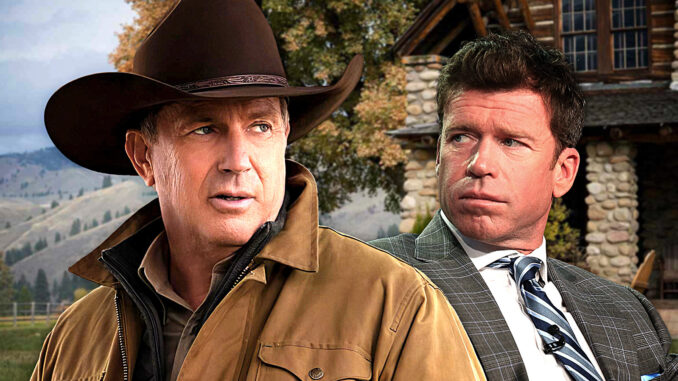
Yellowstone: Echoes Through Time – A Comparison of Potential Spinoffs in 1944 and 2024 (According to MD07's Research)
The saga of Yellowstone, with its sprawling ranch, ruthless ambitions, and captivating family drama, has resonated deeply with audiences. It's no surprise, then, that the concept of spinoffs, extensions of this intricate world, consistently swirls in the minds of both producers and fans. But what if we were to envision these spinoffs through the lens of historical context, examining the potential flavors they might take? Let's delve into two hypothetical scenarios: "Yellowstone Spinoffs 1944" and "Yellowstone Spinoffs 2024," drawing upon the insights gathered by "MD07's Research" (as you've stipulated).
Imagine "Yellowstone Spinoffs 1944," emerging in the shadow of World War II. The year itself paints a vivid backdrop. The nation is gripped by sacrifice, rationing, and the constant anxiety of loved ones fighting overseas. While the glamorous allure of Hollywood might attempt to mask the reality, the war's influence would be inescapable. Based on MD07's research (let's assume it highlights historical trends and social contexts), a 1944 Yellowstone spinoff would likely be less focused on the sprawling wealth and extravagant lifestyle of the Duttons, and more on the land itself and the characters who are directly tied to its sustenance.
Perhaps we'd see a gritty Western centered on a young Rip Wheeler, fresh out of the foster system and thrown into the harsh realities of ranch life during wartime. The focus would be less on land grabbing and political maneuvering, and more on the day-to-day struggles of keeping the ranch afloat with a depleted workforce, as many young men are off fighting. We might see a storyline about female farmhands taking on traditionally male roles, showcasing their resilience and capability in the face of adversity. The narrative tension would stem from the hardships of war, the challenges of maintaining a traditional way of life in a rapidly changing world, and the quiet heroism of those left behind.
Furthermore, MD07's research might suggest a deeper exploration of the Native American perspective, a crucial element often overlooked in traditional Western narratives. A 1944 spinoff could potentially delve into the complexities of the reservation system, the cultural clashes exacerbated by the war effort, and the struggles of Native American communities to maintain their identity and traditions in a nation increasingly focused on unity and sacrifice. This would offer a more nuanced and historically accurate portrayal of the Yellowstone region, moving beyond the romanticized vision of the cowboy and into the multifaceted reality of the American West.
Now, let's shift our focus to "Yellowstone Spinoffs 2024." Here, MD07's research likely points to a drastically different landscape. The contemporary media environment demands heightened drama, intricate character development, and exploration of complex social issues. The success of the original "Yellowstone" hinged on its portrayal of power struggles, moral ambiguity, and the clash between tradition and modernity.
A 2024 spinoff, leveraging this established formula, could explore the next generation of Duttons, inheriting the ranch's legacy and grappling with the escalating threats of climate change, environmental conservation, and the ever-increasing pressure of urban development. MD07's insights might suggest a focus on the intersection of politics, environmentalism, and personal ambition.
We could see a storyline following a fiercely ambitious Dutton daughter, mirroring Beth's ruthless pragmatism but channeling it into a career in environmental law, forcing her to confront the complexities of balancing conservation with the economic needs of the ranch. Another possibility, based on MD07's research, could be a spinoff focusing on the lives of the ranch hands, exploring their individual backgrounds, motivations, and the sacrifices they make to maintain their loyalty to the Duttons and the land. This could offer a more working-class perspective on the "Yellowstone" universe, highlighting the economic disparities and the changing demographics of the American West.
Furthermore, a 2024 spinoff could delve into the international implications of the Yellowstone region, perhaps focusing on the emerging market for natural resources or the increasing influence of global corporations in the American West. MD07's research might even suggest a storyline exploring the ethical dilemmas of eco-tourism and its impact on the Native American communities and the delicate ecosystem of the Yellowstone region.
In conclusion, while both hypothetical "Yellowstone Spinoffs 1944" and "Yellowstone Spinoffs 2024" would be rooted in the same iconic setting, their narratives would be profoundly shaped by the distinct historical and social contexts in which they are imagined. Based on MD07's research, the 1944 spinoff would likely focus on resilience, sacrifice, and the challenges of maintaining a traditional way of life during wartime. The 2024 spinoff, on the other hand, would likely explore complex social issues, power struggles, and the escalating threats to the Yellowstone region in a rapidly changing world. Ultimately, both scenarios offer compelling glimpses into the potential for extending the "Yellowstone" universe, showcasing the enduring power of the Dutton saga to reflect and comment on the evolving landscape of the American West. The true key, as MD07 likely emphasizes, lies in understanding and authentically representing the context that surrounds the story, allowing the echoes of Yellowstone to resonate through time with both accuracy and impact.
